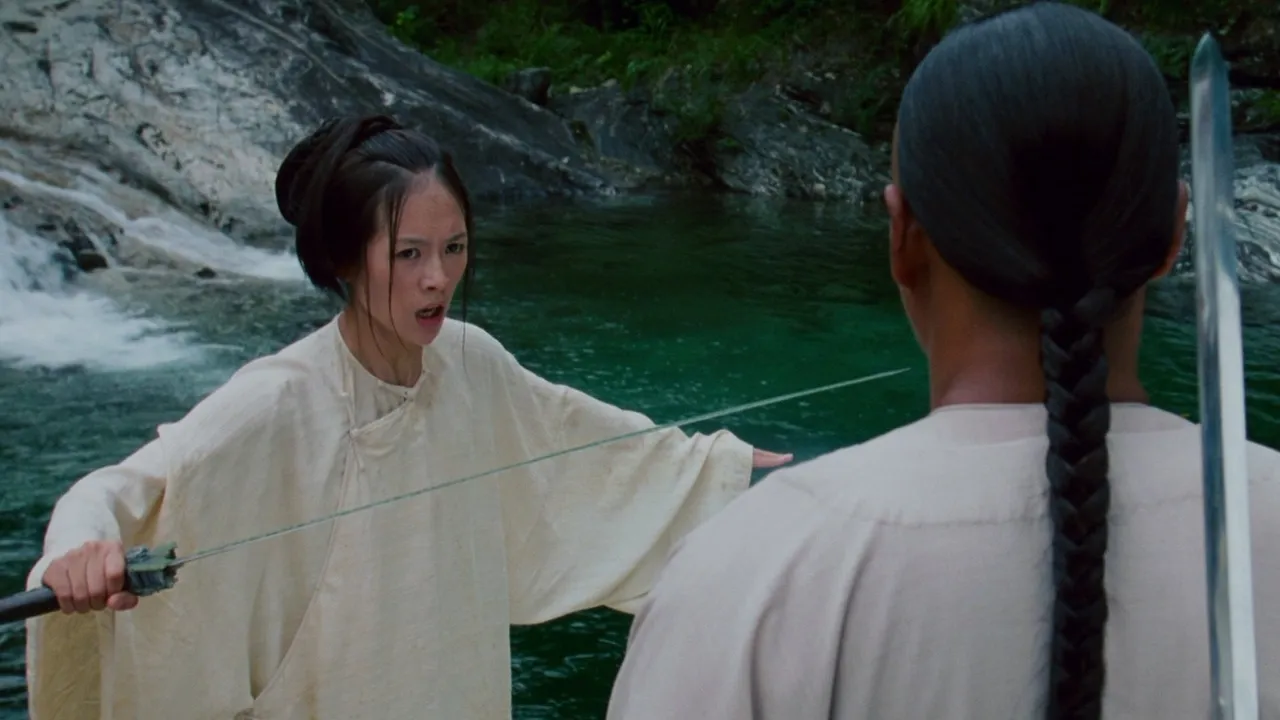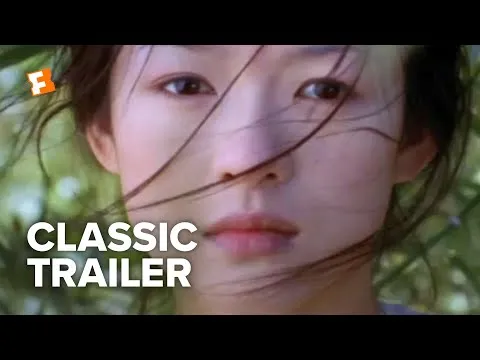
In 1970s it was very common for reviewers and film scholars to describe kung fu films as "easterns". This wasn't very surprising because kung fu films and westerns had many things in common. They were set in very specific locations during very specific time periods (19th Century West, pre-modern China), they had archetypal plots, they revolved around almost ritual forms of violent action and their characters followed specific set of rules and values - alien to modern audiences. Both westerns and kung fu films also had to fight to earn the respect of serious film scholars. Westerns, having a better head start, at least in Western world, succeeded first by being recognised as art, first by critics going gaga over Sergio Leone's work and later by Academy voters. Kung fu films, on the other hand, had to fight xenophobia and bias. Finally, after Tarantino's successful promotion of Hong Kong cinema, kung fu genre got its proper recognition through Crouching Tiger, Hidden Dragon, prestigious 2000 kung fu drama directed by Ang Lee.
The plot, based on the novel by Chinese author Wang Du Lu, is set in early 1800s China, during the reign of Qing Dynasty. Li Mu Bai (played by Chow Yun-Fat) is an expert swordsman and martial arts master who spent all his life fighting bandits and other evildoers. He decides to retire and dedicate himself to meditation, but before that he must entrust his famed Green Destiny sword to Sir Te (played by Lung Sihung), his old friend in Imperial government. The task of delivering sword is given to Yu Shu Lien (played by Michelle Yeoh), female martial arts master and his old comrade. When the sword finally gets to Sir Te's palace, it is stolen by mysterious thief endowed with superb martial arts skill. Li Mu Bai is convinced that the theft was committed by Jade Fox (played by Cheng Pei-pei), bandit queen who had killed his master many years ago. He comes out of retirement, starts to investigate and learns that the thief is Jen Yu (played by Zhang Ziyi), daughter of important Imperial official. She embraced martial arts in order to escape her tightly-controlled and etiquette-bound life of aristocrat for the sake of the adventurous lifestyle he had briefly experienced with Lo "Dark Cloud" (played by Chang Chen), young desert bandit.
Made as international co-production, Crouching Tiger, Hidden Dragon had 15 million US$ of budget, which was unprecedented sum for kung fu films. The success of the film was also unprecedented for this sort of films. It was the first foreign (and subtitled) film to earn more than 100 million US$ on American market, it was worshipped by critics and, finally, it received plenty of prestigious film awards, including "Oscar" for Best Foreign Language Film. After Crouching Tiger, Hidden Dragon kung fu films finally broke out of exploitation cinema ghetto and became legitimate form of cinema.
Reason why many critics ignored their prejudice against kung fu genre might be found in the reputation of this film's director. Taiwanese-born Ang Lee is one of the world's most respected film-makers. Throughout his career, Lee showed incredible ability to handle different genres- romantic comedies, westerns and dramas - as well as different settings - modern-day Taiwan, early 19th Century England, Civil War Midwest and early 1970s America. Crouching Tiger, Hidden Dragon was, on the other hand, more personal project for Lee. Stories of ancient China and its larger-than-life mythical heroes were part of Lee's youth. When the opportunity came, he was more than willing to invest all of his energy and talent to pay proper respect to that magical world.
Lee's talent was well-matched with the talents of his collaborators. Script by Tsai Kuo Jung, Wang-Hui Ling and James Schamus had to solve one difficult problem - how to remain faithful to the rules of kung fu genres and deliver action-packed drama while paying attention to the audience not so familiar with social norms and lifestyles of ancient China. Scriptwriters wisely chose to rely on Lee and his superb directorial skills to guide audience through seemingly boring scenes of character and plot exposition. Lee was fortunate enough to gather diverse but very talented cast. Chow Yun-Fat, arguably the best known actor of them all, built his reputation in the roles of over-the-top gangsters; here he delivers very subdued but powerful performance in the role of near-mythic figure who must suppress his emotions. Michelle Yeoh is also wonderful as his partner - woman torn between duty, common sense and suppressed feelings. Two of them are great, but the most formidable roles belong to actors less known to Western audiences.
Cheng Pei-pei, who used to be big star of 1960s kung fu films, is given great honour by being cast in the role of Jade Fox. Although her character doesn't appear in many scenes, she is very effective. Jade Fox is film's chief villain, but Cheng Pei-pei makes that character complex and even allows audience to sympathise with her to a certain degree. Chang Chen is also good in seemingly thankless role of handsome bandit who steals spoiled aristocrat's heart. But the film's greatest discovery comes in the form of Zhang Ziyi, young dancer who took the hardest role in the film and delivered a truly memorable performance. Ziyi's character represents total opposite of Li Mu Bai and Yu Shu Lien - while they are unhappy because they can't escape constraints of tradition and duty, she rebels against social norms only to discover that such a path also can lead to unhappiness and cause misery to everyone around her. In her role Zhang Ziyi displays wide variety of emotion - passion, admiration, fear and deep anger - and combines it with her athletic abilities that are as impressive as her godlike beauty.
Another important ingredient of Crouching Tiger, Hidden Dragon can be found in the fight scenes. They were choreographed by Yuen Woo Ping, expert whose Hong Kong fame had received global dimensions following his work on The Matrix. Here he isn't aided by CGI and employs more traditional Hong Kong techniques of wireworks instead. The result is series of really magnificent fight scenes. Those scenes are so well-staged that the audience easily accepts characters gliding through air. The most magnificent of those scenes occurs at the very end, when two characters face each other at the treetops. This display of awesome but deadly abilities is well matched by ethereal beauty of natural surroundings. In this scene, just like in many others, film benefits from the wonderful musical score by Tan Dun. Haunting, melancholic sounds are accompanied by brilliant cinematography of Peter Pau. The film sounds and looks greatest in the scenes that depict something rarely seen in budget constrained kung fu films of the past - natural beauties of China. The audience unaccustomed to the epic scope of kung fu films is going to be awed by the deserts, mountains and forests. After watching this film, people who don't know much about China will begin to grasp how vast that country really is.
Although their work isn't perfect (a scene or two is little bit overlong), people who made Crouching Tiger, Hidden Dragon can be proud of their achievements. They made an entertaining, powerful and marvellous film that restores viewers' faith in the artistic potentials of modern cinema industry.
RATING: 9/10 (++++)
(Note: The text in its original form was posted in Usenet newsgroup rec.arts.films.reviews on June 12th 2004)
Blog in Croatian https://draxblog.com
Blog in English https://draxreview.wordpress.com/
Cent profile https://beta.cent.co/@drax
Minds profile https://www.minds.com/drax_rp_nc
Uptrennd profile https://www.uptrennd.com/user/MTYzNA
Rising Star game: https://www.risingstargame.com?referrer=drax
BTC donations: 1EWxiMiP6iiG9rger3NuUSd6HByaxQWafG
ETH donations: 0xB305F144323b99e6f8b1d66f5D7DE78B498C32A7

